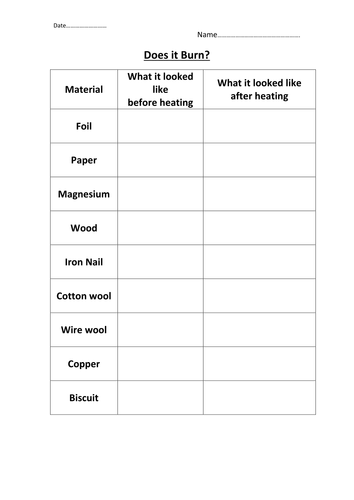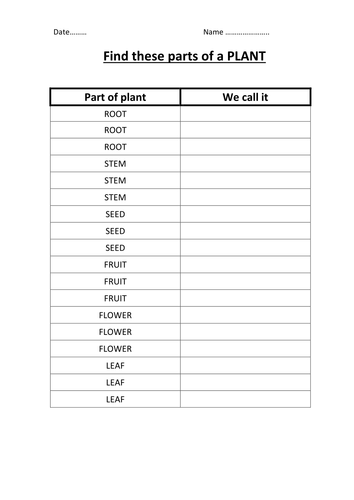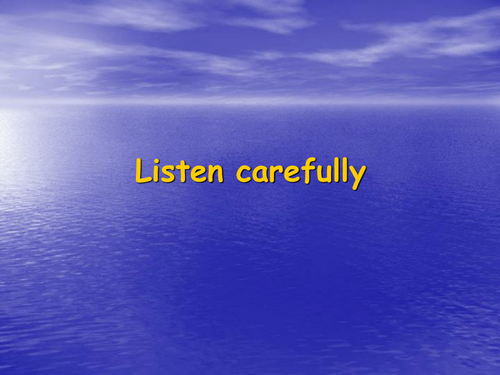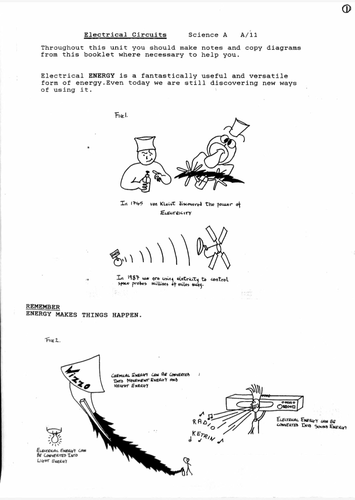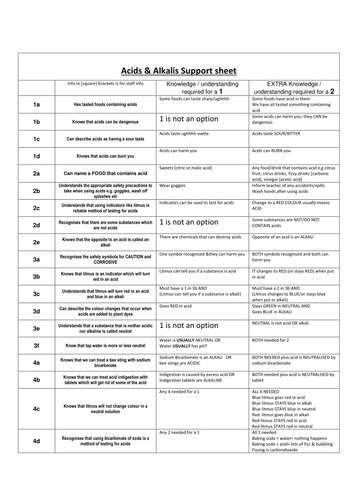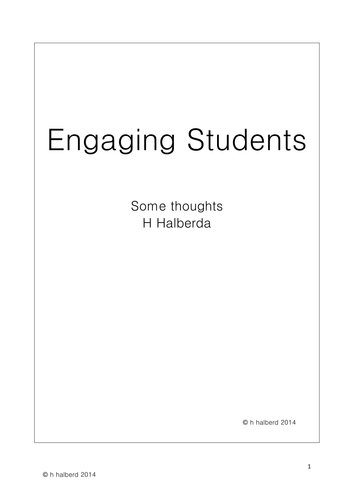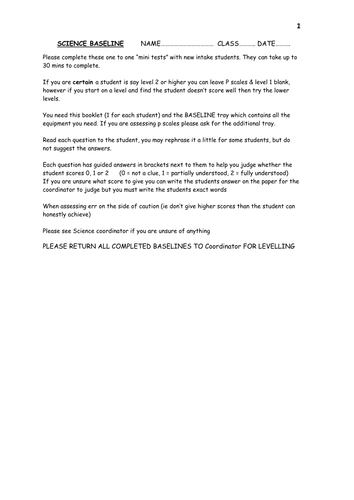
69Uploads
14k+Views
494Downloads
All resources

Does it burn?
Lovely activity, not for the faint hearted.
Give students a selection of materials which they examine and describe simply.
They then (with the required H&S) heat the material/object using a bunsen(roaring or yellow...you decide), tongs, observe and describe the material afterwards.
I have done this expt using tea light candles in a classroom, with bench mats and an extra pair of eyes it worked beautifully.
This promotes many aspects of chemical changes, durability, suitability etc etc of materials for specific tasks

Familiar plants
Very simple worksheet designed to make students realize that scientific names of parts of plants...roots, stem, flower, fruit have common names that they already know...carrot, leek, fruit
I have provided a shopping bag of fruit & veg to display and just let the students explore and realize, of course a set of photos works just as well but you can't eat them afterwards

Earth and Beyond
A nice assessment "old" levels 1 to 5
Assesses student's understanding of the Earth, sun, shadows, Earth's axis, day & night etc etc
Students draw in shapes of Earth, orbits to show understanding. Also draw in the position of the sun at different times as well as shadow changes.
All in all a friendly way to judge progress.
Enjoy.

Listen...can you tell what itis?
A nice powerpoint bunch of slides..sound followed by the answer, you can edit the answers to suit yourself and names of staff for a bit of fun.
Add extra slides with your own sounds/student's or staff voices. Use your imagination...the idea is to recognize sounds...they can be anything..dropping things, flushing, rubbing, scratching, pets, etc etc etc

FORCES powerpoint
Simple visual introduction to FORCES should generate discussion and relevance to student's lives.
All slides have lovely movements and funny stuff

A Basic course in Electricity
Suitable for students and non "physics specialist staff"
Plenty of anecdotal info, historical info but particularly the basics of what electricity is, current, voltage, series, parallell circuits.
plenty of activities and worksheets as well as calculations to do and done for you.
Some of the info is dated as I wrote it in the late 80s but still applicable.
basic stuff can be used with primary but higher level work is appropriate for KS4 and can reinforce work in KS5 especially clearing up some misconceptions I have met in students over the years.

Acids & Alkalis
This is a tried, tested and improved assesment that has worked well with many students.
The assesment is based on the old NC levels 1 to 5 (subdivided into a,b & c)but you can convert into any level description you need, frankly a staged 1 to 5 indicator is as useful as ever whatever you may wish to call it.
I have devised a sytem which gives you a measure of success: each question can score 0, 1 or 2, if a student scores a 2 then you can say they understand the concept fully, score of 1 they understand partially, 0 means they may have experienced the concept but do not understand it much if at all.
The support sheet can be used as a teaching scheme for staff. Split into 3 columns the first column states what concept is being testsd, 2nd column tells you what is required for a score og 1, 3rd column what is required for a score of 2.
I have used this sytem to calculate a score for students...if they achieve 75% or more then I believe you can say they have achieved that level.
Good luck

20 tips to engage students
Having taught in mainstream primary and secondary schools for 25 years and in special education for 14 years I have realized that there is no "fairy dust" that solves the many problems & challenges of everyday teaching.
As Basil Fawlty would say most of this originates from "the bleeding obvious", but it does not harm any of us to be reminded of what is often overlooked, ignored and even considered unimportant as it is difficult to "evidence".
These are my 20 most important “tips”, not “tricks” to help you engage students, although you may well think it is magic when one of these “wins over” a student you thought lost forever to “the dark side”.

SCIENCE BASELINE assessment from level P4 to 4a (old NC levels)
I have used this assessment with students over the years and modified/improved as time went on.
I believe it to be a good way of assessing students when they are new to the school or even at the end of each year or indeed at any time you wish.
It is based around 4 small assessments for Biology, Chemistry & Physics, so a total of 12 mini-assessments.
Ideally the teacher or assistant spends up to 30 mins (can split the assessment over a few days if you wish but best results have been when the entire assessment is completed at one time) in a ONE TO ONE session.
The teacher/assistant reads the script (this is important as it reduces leading questions and clues to answers), the responses are noted down but in most cases a tick will indicate if the student has understood fully, partially understood or not understood at all.
Minimal resources are needed and are kept in a tray for use at any time. I believe doing or demonstrating science is a beautiful way to engage students, so the assesment uses this.
You will need to source basics like balloons, toy car, rocks etc.
I chose to set up 4 trays so 4 assessments could be completed at the same time (perhaps different classes)
The levels assessed are from P4 up to 4a old levels (which I believe are still useful) you may wish to change the names of the levels to suit your own school.
The script states which resources to use in each question as well as appropriate answers that should be expected for fully, partially and not at all levels of understanding. This allows staff that are not science trained to be able to complete these assessments with the students with relative ease.
Good luck

